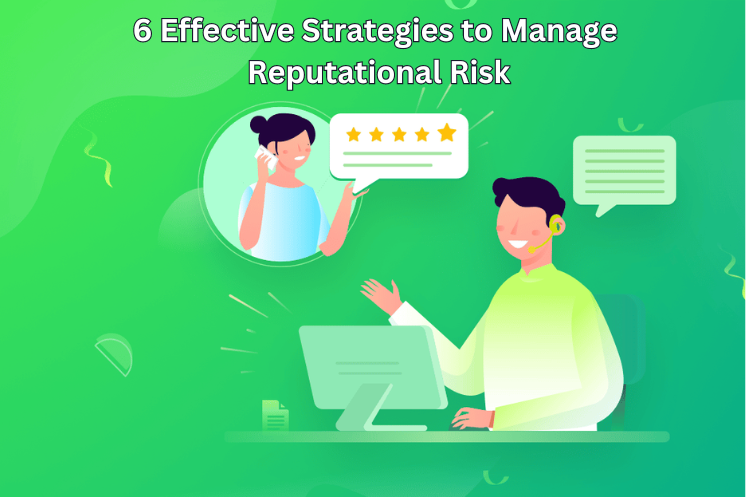
Strategies for Effective Reputational Risk Management
Reputational Risk Management, in essence, pertains to the potential harm that can be inflicted on a company’s image and reputation, resulting from unfavorable events, actions, or public perception. The significance of adeptly managing this risk cannot be overstated in today’s interconnected and fast-paced world. Doing so is instrumental in preserving trust among stakeholders, ensuring long-term success, and averting the dire consequences of a tarnished reputation.
Why is Reputational Risk Important?
Effectively addressing and managing reputational risks is paramount due to the repercussions that arise when a company’s reputation is compromised:
Large Financial Losses: A damaged reputation can lead to substantial financial setbacks.
Loss of Customer Trust: Trust is a cornerstone of business relationships, and reputational harm erodes this trust.
Inability to Attract New Customers or Employees: A tainted reputation makes it challenging to attract both customers and talent.
In today’s digital era, negative news and unfavorable reviews spread like wildfire, making it imperative for businesses to proactively manage the risks they face. A strong reputation, on the other hand, equips companies to weather challenges and gain a competitive edge, providing benefits such as:
Increased Customer Loyalty
Ability to Attract Top Talent
Positive Relationships with Stakeholders
Examples of Reputational Risk
Understanding the various types of reputational risks is pivotal for effective management and mitigation. Let’s explore some common types of reputational risks that can impact a company’s image:
Negative Reviews and Press
In the digital age, a single negative review or adverse press coverage can swiftly damage a company’s reputation, thanks to the influence of social media and online review platforms. To maintain a positive brand image, it’s essential to promptly respond to reputational risks by actively monitoring and addressing unfavorable reviews and press.
Data Breaches
The increasing reliance on technology and customer data tracking has made data breaches a substantial reputational risk for businesses. Such breaches can result in customer mistrust, damaged relationships, and negative publicity. Reducing the risk of data breaches necessitates robust internal controls and stringent data security measures.
Operational Risk
Operational failures, which can encompass supply chain disruptions, product recalls, service outages, equipment failures, human error, staffing issues, and environmental events, can significantly impact a company’s reputation. To mitigate operational risks, having a well-defined risk management plan is indispensable. Customers expect reliability and consistency, and any deviation from these expectations can harm a company’s reputation.
Social Responsibility Issues
In the socially conscious landscape of today, customers pay close attention to a company’s commitment to social responsibility. Failures in these areas can lead to reputational damage. Companies can bolster their reputations by prioritizing social responsibility and integrating it into their core business practices.
Competitor Actions
The actions of competitors can also pose reputational risks to businesses. When competing companies engage in unethical practices, it can negatively affect the entire industry. Mitigating reputational risk stemming from competitor actions involves maintaining high ethical standards, emphasizing transparency, and prioritizing customer service.
6 Effective Strategies to Manage Reputational Risk

Businesses can adopt the following six strategies to effectively manage their reputational risk:
- Develop a Crisis Management Plan
Establish a comprehensive crisis management plan that outlines your organization’s response to potential threats and crises. This plan should encompass designated spokespersons, communication strategies, and contingency plans for various scenarios. Regularly review and update the plan to ensure its effectiveness.
- Monitor Your Online Presence
Regularly review your business’s online presence, including social media platforms, review sites, and news outlets. Address negative feedback proactively by responding promptly and professionally. Utilize positive feedback to uphold a positive brand image.
- Encourage Transparency
Foster a culture of transparency within your business by being open with stakeholders about your company’s goals, strategies, and progress. Create channels for open communication and demonstrate accountability by being responsive to stakeholder feedback.
- Prioritize Ethics and Compliance
Maintain a strong ethical foundation and compliance with laws and regulations. Implement clear corporate ethics policies, provide regular training, and establish a system for reporting and addressing ethical concerns. Demonstrating integrity safeguards your reputation and attracts customers, employees, and investors.
- Train Employees on Reputational Risk Management
Educate your employees on the importance of reputation and provide them with tools to identify and report potential risks. Offer training sessions on communication, social media, and customer interaction. Empower employees to act as brand ambassadors to promote a positive image.
- Foster Strong Relationships with Stakeholders
Build positive relationships with key stakeholders, including customers, employees, investors, and suppliers. Engage with these groups, address their concerns, and regularly solicit their feedback. These relationships serve as a network of advocates that can protect your reputation during crises.
Build Brand Better – Your Reputation Management Partner
In today’s fiercely competitive landscape, managing reputational risk is paramount. That’s where Build Brand Better, online reputation management company, comes into play. At Build Brand Better, we specialize in helping businesses like yours navigate the intricate world of reputation management.
Why Choose Build Brand Better?
Expertise: With years of experience, we have a team of reputation management experts who understand the nuances of maintaining and enhancing your brand’s reputation.
Proactive Approach: We proactively monitor and address reputational risks, ensuring your brand’s image remains positive.
Tailored Solutions: We customize our strategies to suit your specific needs, ensuring a personalized approach to reputation management.
Comprehensive Services: From online presence management to crisis response, we offer a comprehensive suite of services to protect and enhance your reputation.
By partnering with Build Brand Better, you can rest assured that your reputation is in capable hands. Contact us today to learn more about how we can help you build and safeguard your brand’s reputation.
FAQ
Q1: What is reputational risk, and why is it significant for businesses?
A1: Reputational risk refers to the potential harm that can be inflicted on a company’s image and reputation due to negative events, actions, or public perception. It’s significant for businesses because a damaged reputation can lead to large financial losses, loss of customer trust, and difficulty in attracting new customers and employees.
Q2: What are some common examples of reputational risks that businesses face?
A2: Common examples of reputational risks include negative reviews and press, data breaches, operational failures (such as supply chain disruptions or product recalls), social responsibility issues, and competitor actions that negatively affect the entire industry.
Q3: How can businesses proactively manage reputational risk?
A3: Businesses can proactively manage reputational risk by:
Developing a crisis management plan.
Monitoring their online presence and addressing negative feedback promptly.
Encouraging transparency within the organization.
Prioritizing ethics and compliance.
Providing employee training on reputational risk management.
Fostering strong relationships with stakeholders.
Q4: Why is transparency important in managing reputational risk?
A4: Transparency is crucial because it builds credibility and trust. Being open and honest about your company’s goals, strategies, and progress demonstrates accountability and responsiveness to stakeholder feedback, which helps maintain a positive reputation.
Q5: What role does an online reputation management company like Build Brand Better play in mitigating reputational risks?
A5: Build Brand Better specializes in helping businesses navigate the complexities of reputation management. Their expertise, proactive approach, tailored solutions, and comprehensive services ensure that businesses can effectively monitor, protect, and enhance their brand’s reputation.
For more Blogs:- www.buildbrandbetter.io/blog/
